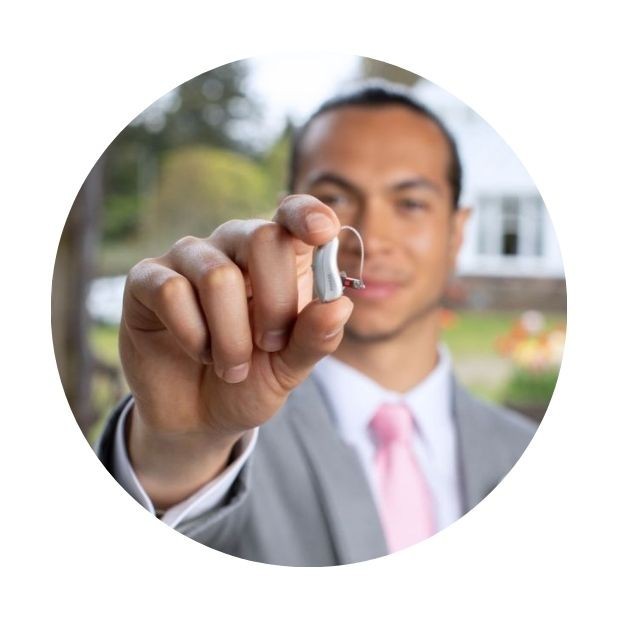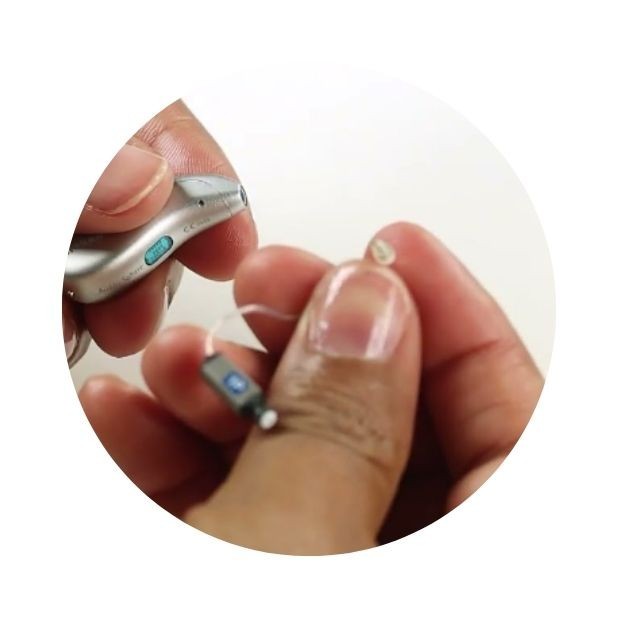
Replacement Hearing Aids in the UK
What should you do if you lose your hearing aids? How can you get replacement hearing aids? When is it time to upgrade?
Replacing hearing aids
Replacing hearing aids can significantly enhance your hearing experience. Newer models offer advanced technology, improved sound quality, and better comfort. Whether upgrading for better performance, replacing lost devices, or addressing changes in your hearing, choosing the right replacement can make a world of difference, helping you reconnect with the sounds around you.
Whether you're replacing lost hearing aids, upgrading worn-out devices, or taking advantage of new technology, we're here to support you through the entire process - from assessment to fitting to disposal of your old aids. All our replacement services include the same lifetime aftercare commitment as new purchases.
Small devices, but big investments to lose
Hearing aid devices can be small and discreet, especially some ITE models, and are commonly lost. Losing something valuable to us is one of life’s vexes. Chances are we’ve all had episodes of misplacing car keys, jewellery and mobile phones. You might have even had the unfortunate experience of losing a hearing aid in the past.
The panic when you realise your hearing aid is missing is genuinely awful - we hear about it regularly. Suddenly, you're cut off from conversations, struggling with the television, and facing the prospect of replacing an expensive device. If this has happened to you, take a deep breath - we can help.
Digital hearing aids are commonly one of the most expensive devices and investments we own and need every day. This is why we must do everything we can to keep them safe and regularly carry out maintenance checks to keep them in optimum shape and performance.
I've lost my hearing aids
If you have lost a hearing aid, we hope that this article will help, as we focus on some brief tips to assist you in hearing at your best again.
We also cover what to do if you need replacement hearing aids and other hearing aid troubleshooting problems such as:
- Faulty and damaged hearing aids
- How to avoid losing your hearing aids
- How to get replacement hearing aids
- Hearing aid insurance and hearing aid warranty
- Hearing aid replacement parts
- Replacement hearing aid batteries
- Upgrading your hearing aids

Replacement Hearing Aids UK
Upgrading your hearing aids
When is the right time to upgrade your hearing aids?
Like other complex technologies, we upgrade when we feel that there are better and more advanced devices out there on the market. Hearing aids are no different, and it is important to know when to think about upgrading yours.
How often should I upgrade my hearing aids?
As a rule of thumb, hearing aids need to be upgraded every few years - usually around 3 or four - due to many reasons, not just because your old devices can't be repaired. Most people upgrade between 4-7 years, though some keep aids working well beyond this with proper maintenance.
There's no "must upgrade" timeline - it depends on your satisfaction, your hearing changes, and whether technology has advanced enough to benefit you meaningfully. Consider replacing your hearing aids if:
Your hearing has changed
Our hearing changes just like our eyes do, and over time, you'll realise that your hearing aids aren't powerful enough to assist you. You'll notice this deterioration especially if your hearing alters and becomes more profound, and you are currently wearing hearing aids for mild to moderate hearing loss. This is when your hearing will be supported more beneficially with power aids.
Signs your hearing has changed beyond your current aids:
- Constantly turning the volume to maximum, but still struggling
- Friends and family comment that you're not hearing as well as you used to
- Your audiologist has adjusted settings to their limits with no improvement
- Annual hearing tests show progressive decline
- You're avoiding situations you previously managed comfortably
Your health has changed
Health changes can also be a reason why you should think about replacing your existing hearing aids. This is generally a dexterity issue, as often people who contract arthritis in their hands can make putting in ITE hearing aids very difficult.
You might also struggle to put in and take out batteries. This is when BTE hearing aid styles might be better suited to your new needs, or even rechargeable hearing aids, when battery replacement isn't needed.
There's no shame in admitting dexterity has become difficult - we'd rather switch you to more manageable aids than have you struggle daily or stop wearing them altogether. Vision changes, tremors, or reduced fine motor control are all valid reasons to consider different styles.
You've had your existing hearing aids for a long time
As we stated earlier, hearing aids should be replaced every four years. So if your hearing aids are older than that, consider an appointment with your audiologist to discuss other, more advanced options.
The reason for this is that, usually, between three and seven years is the life span of hearing aids. You wear them every day, and naturally, they go through a lot of wear and tear.
They are constantly working and connecting, and adjusting to help you hear better. Regular maintenance does help keep your hearing aids going, but it is the new technology that makes the difference. What actually wears out on hearing aids:
- Receivers (speakers) degrade from earwax exposure and moisture
- Microphone sensitivity reduces over time
- Plastic casings become brittle and crack
- Battery contacts corrode
- Internal components simply reach the end of their life from constant use
- Software becomes outdated and can't receive manufacturer updates
For instance, your older hearing aids simply won't deliver the best hearing performance for you as a newer device on the market. Technology is continuously being modernised - offering more efficiency, refined listening experiences and more.
There are many hearing aids today that incorporate artificial intelligence, so they are constantly learning about your hearing specifications and adjusting automatically. Another hearing aid breakthrough is the use of motion sensors within hearing aids. These are designed to understand and adapt based on your movements, so you always hear at your best wherever you are.
Modern hearing aids are offering great technology as standard in today's market, which you are not benefiting from with your current aids. Newer hearing aids will likely be able to...
- Detect, understand and manage background or wind noise.
- Amplify speech in noise.
- Enhance speech focus in conversation.
- Connect to smartphone apps and other Bluetooth devices.
Your lifestyle has changed
You might have adapted to a life that is more active and now need your hearing aids to keep up. Alternatively, you aren't as active as you used to be and may need a simpler model that is less complicated. Examples of lifestyle changes that prompt upgrades:
- Retirement means more social activities (need better noise management)
- Started video calling grandchildren regularly (need Bluetooth connectivity)
- Took up a new hobby like choir or theatre (need music program features)
- Reduced activity levels (might benefit from simpler, easier-to-manage aids)
- Started exercising more (need sweat-resistant, secure-fitting models)
- Health issues mean more medical appointments (need aids that work well with masks)
Your wants and needs have changed
When you originally purchased your hearing aids, you might have got a more basic model because it felt too new and complex a device. You might now feel more confident in wearing your hearing aids and have found that you would like to tap into more connectivity and advanced features that modern hearing aids can provide.
Or you have a better idea of what you want, and perhaps your priorities have changed. For instance, the universal connectivity of Phonak Paradise hearing aids or the artificial intelligence seen in Oticon More might now sound more appealing than a basic model. Consumer expectations are growing, and with it, technology has had to adapt and bring out new worlds first, which offer you and your hearing loss more.
It's completely normal to start with basic aids and upgrade later once you understand what you're missing. Many people tell us, "I wish I'd got these features from the start" - but honestly, you needed time to understand what mattered to you. Your first aids were training wheels; upgrades are about optimising for your real life.

How to Get Replacement Hearing Aids
How can my audiologist help me with upgrading my hearing aids?
How to get replacement hearing aids
Your local audiologist will go through the features you are benefiting from already with your hearing aids, and what works well and what doesn't work as well. They will show you what is now on offer and how these advancements can complement your hearing and lifestyle.
They will go through every step of how to use your hearing aids, so you always get the most out of them. You should never leave a fitting appointment without good knowledge of your new devices. Your audiologist will also make any adjustments needed in your follow-up appointment, based on your hearing needs and how you've adapted to your new aids.
Your audiologist can also help you with:
- Faulty and damaged hearing aids: Small damage to your hearing aids can often be repaired by your audiologist. If they can't assist you, they will send you off to the manufacturer.
- Replacement batteries: Audiologists usually have a good stock of hearing aid batteries, which you can purchase as and when you need them. Most of our patients choose to have their batteries posted out monthly by direct debit, so they don't need to worry about remembering to order fresh ones.
- Hearing aid replacement parts: There might be certain cases where your audiologist has spare parts available in their clinic, or they might be able to order them. For more complex parts, they may need to send your hearing aids off to the manufacturer.
- Other troubleshooting issues that your audiologist could resolve: Replacement hearing aid buds, replacement hearing aid battery door, replacement hearing aid charger, replacement tubes for hearing aids and more.
NHS replacement hearing aids
NHS hearing aids are free and provided on a long-term loan basis; therefore, you don't own your hearing aids. Repairs and batteries are also free, but you will be charged if you damage or lose your hearing aids.
How to make a claim and receive replacement hearing aids, as well as replacement hearing aids
The main process for claiming lost or stolen hearing aids is to contact your insurance provider, and they will first explain the process to you in detail and then support you in receiving your replacement hearing aids. The cost you will need to cover would all depend on your insurance policy and the excess you agreed to.
Hearing aid insurance and hearing aid warranty
So, is a hearing aid warranty or hearing aid insurance worth it? Whilst some people can get their digital hearing aids covered under their household insurance, many insurance companies these days either don’t offer this or can charge a hefty premium to do so.
Some people are also concerned that they may lose their no-claims discount on their household insurance should they need to make a claim. Due to this, we as a company give hearing aid wearers more flexibility around this issue; we now offer two options: hearing aid insurance and hearing aid warranty. You can learn more about the differences here

3 basic tips on how to avoid losing your hearing aids
Putting labels on all hearing aid boxes and cases: A lot of technology has very similar casings, and it is sometimes very easy to get them mixed up.
Some of our patients use glow-in-the-dark stickers, just in case they need to locate their hearing aids and other technology items in the dark.
Use your hearing aid case: All hearing aids should come with a case or pouch, which is ideal for travelling or for keeping your devices safe and out of reach when not using them.
Keep them out of reach and at eye level: If you have any pets or children/grandchildren, it is advised that you keep your hearing aids out of reach.
Take care when removing your hearing aids: Try not to take out your hearing aids in public or during social events, as the chances of losing them or much higher, and the chances you'll find them are considerably lower.
If you have to remove them for whatever reason, ensure you remove them slowly, put them in a hearing aid case and store them safely.

Tips on how to find your hearing aids
Losing hearing aids can be a frustrating and inconvenient experience, especially if you rely on them to hear and communicate effectively. If you have lost your hearing aids, there are a few steps you can take to try to find them:
- Search the area where you think you may have lost them: Look in the places where you were last wearing them, as well as any nearby areas where they may have fallen off or been misplaced.
- Check with friends and family members: If you were with other people when you lost your hearing aids, they may have picked them up or seen where they went.
- Check with any businesses or organisations you visited: If you lost your hearing aids while out in public, you can try contacting businesses or organisations you visited to see if they have found them.
- Consider using a tracking device: Some hearing aids come with tracking devices that can help you locate them if they are lost. You can also purchase separate tracking devices that can be attached to your hearing aids.
Need more support on replacement hearing aids or looking to upgrade?
If you are unable to locate your hearing aids, you may need to replace them. It is important to talk to a qualified hearing healthcare professional to find the best options for your needs and budget.
In the meantime, you can use assistive listening devices or other alternatives to help you hear while you are waiting to get new hearing aids. Call us free on 0800 567 7621 to talk to an audiologist who can support you with hearing loss, hearing aid upgrades, hearing tests and other hearing healthcare guidance.
Our specialist service includes:
Do not spend hundreds of pounds without getting a second opinion from us.
Please call us on 0800 567 7621
 Not only are the prices great, but the service is fantastic! Many thanks to your team.
Not only are the prices great, but the service is fantastic! Many thanks to your team.What's included in our hearing aid prices?
Other pages you might find useful
FAQs
In general, any audiologist will always recommend to you the hearing aid model that best suits your needs. Here is a useful checklist to make sure that is the case.
- Audiologist's level of knowledge: The audiologist you have seen will hopefully have a wide knowledge of all available hearing aids; however, some will only be familiar with a small number of brands and, therefore, may not really be in a position to know which model is the best for you. It is OK to challenge their recommendation and ask them to justify why this particular brand is the one for you.
- Do research: Read about the hearing aid that was recommended. Does it seem like it will suit your lifestyle? Does it have more or fewer features than you need?
- Be aware of sales targets: Many high street retailers have specific tie-ins to a particular manufacturer/brand. The hearing aid they have suggested may still be the correct one for you, but do your research so that you know why they might have recommended it.
If you have significant hearing loss in both ears, you should be wearing two hearing aids. Here are the audiological reasons why:
Localisation: The brain decodes information from both ears and compares and contrasts them. By analysing the minuscule time delays as well as the difference in the loudness of each sound reaching the ears, the person is able to accurately locate a sound source.
Simply put, if you have better hearing on one side than the other, you can't accurately tell what direction sounds are coming from.
Less amplification is required: A phenomenon known as “binaural summation” means that the hearing aids can be set at a lower and more natural volume setting than if you wore only one hearing aid.
Head shadow effect: High frequencies, the part of your hearing that gives clarity and meaning to speech sounds, cannot bend around your head. Only low frequencies can. Therefore, if someone is talking on your unaided side, you are likely to hear that they are speaking, but be unable to tell what they have said.
Noise reduction: The brain has its own built-in noise reduction, which is only really effective when it is receiving information from both ears. If only one ear is aided, even with the best hearing aid in the world, it will be difficult for you to hear in background noise as your brain is trying to retain all of the sounds (including background noise) rather than filtering them out.
Sound quality: We are designed to hear in stereo. Only hearing from one side sounds a lot less natural to us.
Fancy some further reading on this topic? You can read about why two hearing aids are better than one in our article, hearing aids for Both Ears, here
For most people, the main benefit of a rechargeable hearing aid is simple convenience. We are used to plugging in our phones and other devices overnight for them to charge up. Here are some other pros and cons:
For anybody with poor dexterity or issues with their fingers, having a rechargeable aid makes a huge difference, as normal hearing aid batteries are quite small and some people find them fiddly to change.
One downside is that if you forget to charge your hearing aid, then it is a problem that can't be instantly fixed. For most, a 30-minute charge will get you at least two or three hours of hearing, but if you are the type of person who is likely to forget to plug them in regularly, then you're probably better off with standard batteries.
Rechargeable aids are also a little bit bigger and are only available in Behind-the-Ear models.
Finally, just like with a mobile phone, the amount of charge you get on day one is not going to be the same as you get a few years down the line. Be sure to ask what the policy is with the manufacturer's warranty when it comes to replacing the battery.
For most people, the answer is yes. But it's never that simple.
The majority of hearing problems affect the high frequencies a lot more than the low ones. Therefore, open fitting hearing aids sound a lot more natural and ones that block your ears up can make your own voice sound like you are talking with your head in a bucket. Therefore, in-ear aids tend to be less natural.
However, the true answer is we can't tell until we have had a look in your ears to assess the size of your ear canal, and until we have tested your hearing to see which frequencies are being affected.
People with wider ear canals tend to have more flexibility, also there are open fitting modular CIC hearing aids now that do not block your ears.
There is also the age-old rule to consider, that a hearing aid will not help you if it's sat in the drawer gathering dust. If the only hearing aid you would be happy wearing is one that people can't see, then that's what you should get.
Most people can adapt to any type of hearing aid, as long as they know what to expect. Have an honest conversation with your audiologist as to what your needs are.
Generally speaking, six or more. Unless it's none at all. The number of channels a hearing aid has is often a simplistic way an audiologist will use to explain why one hearing aid is better than another, but channels are complex, and it is really not that straightforward. Here are some reasons why:
Hearing aids amplify sounds of different frequencies by different amounts. Most people have lost more high frequencies than low, and therefore need more amplification in the high frequencies. The range of sounds you hear is split into frequency bands or channels, and the hearing aids are set to provide the right amount of hearing at each frequency level.
Less than six channels, and this cannot be done with much accuracy, so six is the magic number. However, a six-channel aid is typically very basic with few other features and is suitable only for hearing a single speaker in a quiet room. The number of channels is not what you should be looking at; it's more the rest of the technology that comes with them.
As a final note, different manufacturers have different approaches. One method is not necessarily better than any other. For example, some manufacturers have as many as 64 channels in their top aids. Most tend to have between 17 and 20. One manufacturer has no channels at all.
Manufacturer's warranties typically last between 2-5 years, depending on the brand and model, and cover defects in materials and workmanship. This includes repairs for component failures, electronic malfunctions, and manufacturing defects, but excludes damage from misuse, accidents, or normal wear. Most manufacturers also include loss and damage insurance for the first year.
We handle all warranty claims on your behalf, liaising with manufacturers and ensuring you get replacement devices quickly when needed. This comprehensive warranty coverage, combined with our lifetime aftercare, gives you complete peace of mind.
Our hearing tests are completely free, whether at our clinics or in your home. Unlike other providers who charge £30-£100 for home visits, we believe hearing healthcare should be accessible without financial barriers. Our comprehensive assessments include examination by a registered audiologist, audiogram results, and personalised recommendations.
All testing, future adjustments, and ongoing support are included at no extra cost. While NHS tests are also free, typical 6-week waiting periods often lead people to seek immediate private testing. We provide prompt, professional assessments that fit your schedule and budget.
Yes, we offer completely free home visits throughout the UK, and this service is included in our prices with no additional charges. Home visits are particularly valuable for people with mobility issues, busy schedules, or those who simply prefer the comfort and convenience of their own environment.
Our audiologists can conduct full hearing tests, fit hearing aids, and provide ongoing support in your home. This service sets us apart from many providers who either don't offer home visits or charge extra for them.
We can offer prices up to 40% lower than high street retailers because of our business model. As a network of 200+ independent audiologists, we don't have the massive overheads of large retail chains - no expensive high street premises, no sales targets pushing audiologists to sell the most expensive options, and no costly marketing campaigns.
However, we maintain the same buying power as the big chains because we purchase on behalf of our entire nationwide network. This means you get access to the same premium hearing aids with professional service, but at genuinely competitive prices.
We offer a comprehensive 60-day money-back guarantee, which gives you twice the industry standard time to properly assess whether your hearing aids are right for you. This extended period recognises that adjusting to hearing aids takes time, and your brain needs several weeks to adapt to the amplified sounds.
Unlike many providers who offer just 30 days, we believe 60 days gives you the confidence to test your hearing aids in all the situations that matter to you - from quiet conversations at home to busy restaurants and outdoor activities.
Ask the Experts
6 Morton Lane
Walkwood
Redditch
Worcestershire
B97 5QA
Latest Launch
When we refer to a product as 'Latest Launch', we mean it is the latest to be released on the market.
New
When we refer to a product as 'New', we mean that the product is the newest hearing aid model on the market.
When we refer to a product as 'Superseded', we mean that there is a newer range available which replaces and improves on this product.
Older Model
When we refer to a product as an 'Older Model', we mean that it is has been superseded by at least two more recent hearing aid ranges.

